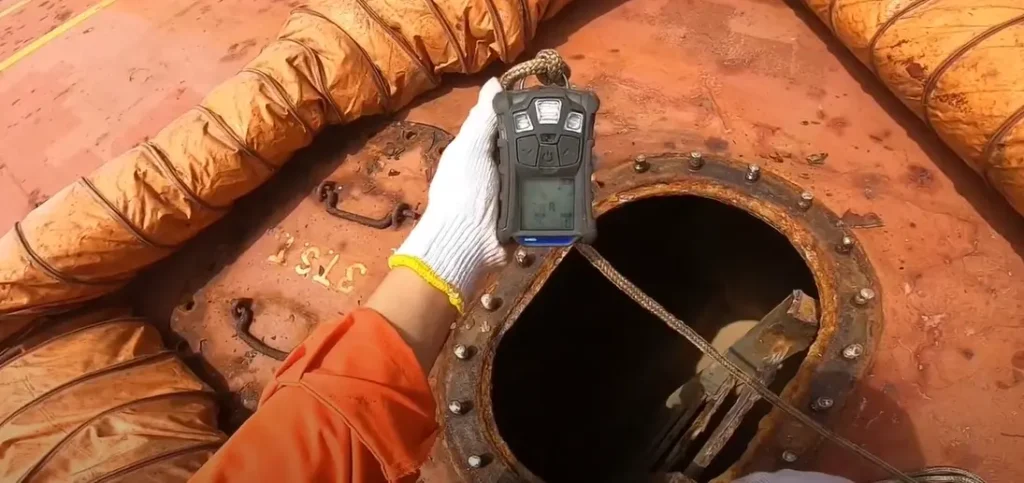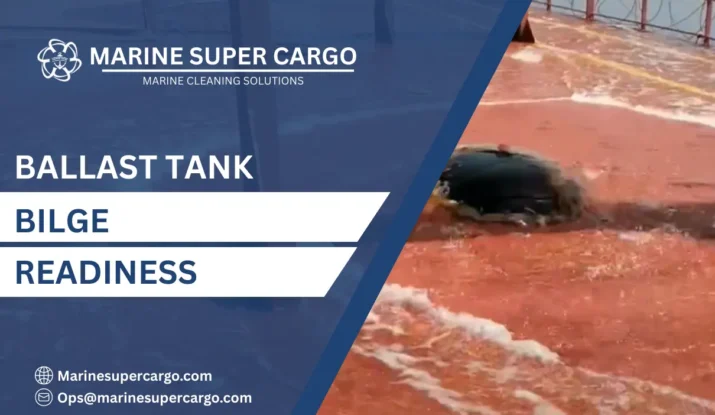Ballast tank bilge readiness represents critical operational assessments for bulk carrier vessels maintaining proper stability and environmental compliance. These comprehensive evaluations examine structural integrity, drainage systems, and contamination levels throughout vessel ballast operations. Understanding ballast tank bilge readiness requirements is essential for preventing pollution incidents and ensuring regulatory compliance.
The systematic approach of ballast tank bilge readiness protects marine environments from bow to stern ballast system operations. These detailed procedures examine tank conditions, bilge pump effectiveness, and water quality throughout vessel compartments. Ballast tank bilge readiness protocols must address varying operational conditions across port and starboard ballast tank systems.
Ballast tank bilge readiness procedures ensure proper system functionality and environmental protection during ballast operations. The comprehensive nature of these assessments guides appropriate maintenance scheduling and operational protocol development. Forward ballast tanks near the forecastle require particular attention during ballast tank bilge readiness evaluations due to structural loading patterns and drainage system complexity.
READ MORE: hold bilge management washing Fujairah
Comprehensive Tank Condition Assessment Protocols
Ballast tank bilge readiness involves detailed inspection of structural integrity, coating conditions, and corrosion levels throughout bulk carrier ballast systems. These evaluations identify potential failure points, drainage obstructions, and contamination sources that affect system performance. Tank condition monitoring guides proper maintenance scheduling and operational safety protocols.
The systematic approach of ballast tank bilge readiness examines structural variations between different ballast tank configurations throughout vessel compartments. Port-side ballast tanks often experience different corrosion patterns due to cargo loading sequences and atmospheric exposure conditions. Starboard ballast systems may present varying maintenance requirements based on operational procedures and environmental factors.
Environmental protection protocols during ballast tank bilge readiness prevent marine pollution while ensuring complete system assessment throughout inspection operations. Aft ballast tanks near machinery spaces require specialized evaluation due to potential cross-contamination from engine room operations. These comprehensive procedures ensure proper system maintenance and environmental compliance.
MARPOL and IMO Regulatory Compliance Framework
The International Maritime Organization (IMO) establishes comprehensive guidelines for ballast water management and environmental protection requirements through international regulations. MARPOL Annex I specifically addresses ballast tank management and contaminated water discharge prevention protocols.
Ballast tank bilge readiness must comply with international environmental standards for marine pollution prevention and ballast water treatment procedures. All assessment operations require proper documentation and certified inspection procedures meeting regulatory specifications. The IMO mandates detailed ballast system monitoring and environmental compliance documentation.
International environmental regulations require specialized assessment protocols during ballast tank bilge readiness to prevent marine ecosystem contamination. Vessel operators must maintain comprehensive ballast management databases and certified maintenance facility coordination. MARPOL compliance demands certified inspection procedures and proper maintenance documentation protocols.
Professional Assessment Services by Marine Super Cargo
Marine Super Cargo specializes in comprehensive ballast tank bilge readiness through advanced inspection technologies and certified marine engineering specialists. Our experienced assessment teams understand complex ballast system requirements and maintain strict adherence to IMO standards throughout all operations.
Our systematic approach includes detailed structural inspection, drainage system evaluation, and comprehensive contamination assessment throughout all ballast tank operations. We utilize specialized inspection equipment and assessment protocols designed for ballast tank bilge readiness requirements. Our teams coordinate closely with vessel crews to ensure complete regulatory compliance implementation.
Marine Super Cargo employs certified marine surveyors who understand the complex requirements for ballast tank assessment operations. We maintain proper documentation protocols and specialized inspection capabilities throughout all evaluation activities. Our safety-first approach ensures regulatory compliance while achieving comprehensive ballast tank bilge readiness objectives.

Drainage System Functionality and Performance
Bulk carriers require comprehensive drainage assessment during ballast tank bilge readiness to ensure proper water management and system reliability. These critical evaluations include bilge pump performance, drainage line integrity, and flow capacity throughout ballast operations. Advanced testing procedures verify system effectiveness while identifying potential failure points.
Forward ballast tank drainage systems often present unique operational challenges during ballast tank bilge readiness due to structural configuration and pump positioning requirements. Aft compartments near machinery spaces may experience different drainage characteristics requiring specialized assessment approaches. Professional evaluation protocols address varying system configurations throughout vessel ballast operations.
Specialized testing equipment deployment follows comprehensive system assessment to ensure drainage reliability during ballast tank bilge readiness operations. Performance monitoring ensures proper water management while maintaining operational safety standards. Professional assessment prevents system failures while achieving complete drainage functionality objectives.
Contamination Control and Water Quality Management
Ballast tank bilge readiness requires precise contamination monitoring that ensures environmental compliance and system cleanliness during ballast operations. Water quality assessment identifies oil contamination, sediment accumulation, and chemical residues throughout ballast tank systems. Proper contamination control prevents environmental discharge violations while maintaining system integrity.
Contamination source identification during ballast tank bilge readiness enables proper treatment planning and prevention protocol development throughout ballast operations. Different contamination types require specific management approaches including separation, treatment, and disposal procedures. Specialized monitoring equipment ensures complete contamination detection while preventing environmental release.
Marine Super Cargo provides comprehensive contamination control services designed to ensure environmental protection and system cleanliness. Our services include water quality testing, contamination source identification, and treatment system coordination for ballast tank bilge readiness operations throughout bulk carrier facilities.
Structural Integrity and Maintenance Planning
Modern ballast tank bilge readiness emphasizes comprehensive structural assessment that ensures long-term system reliability and safety performance. Structural inspection identifies corrosion damage, coating deterioration, and structural fatigue that affects ballast tank integrity. These assessments guide proper maintenance scheduling and repair priority development.
Maintenance planning coordination during ballast tank bilge readiness enables proper resource allocation and operational scheduling throughout vessel maintenance operations. Structural condition assessment guides repair requirements, coating renewal programs, and component replacement scheduling. Specialized inspection techniques ensure comprehensive structural evaluation and maintenance planning.
International safety regulations require certified structural assessment during ballast tank bilge readiness to ensure system reliability and environmental protection. Professional maintenance coordination ensures operational continuity while maintaining safety standards throughout ballast system operations.
Operational Readiness and System Performance
Ballast tank bilge readiness requires detailed operational testing to verify system performance and ensure reliability throughout ballast operations. These comprehensive evaluations include pump performance testing, valve operation verification, and control system functionality assessment. Proper testing ensures operational readiness while maintaining safety standards.
System performance verification protocols must include operational testing, performance benchmarking, and reliability assessment for all ballast system components. Ballast tank bilge readiness testing provides essential verification of system capability and operational reliability throughout vessel operations.
Frequently Asked Questions
Q1: What structural conditions are assessed during ballast tank inspections?
A: Corrosion levels, coating conditions, structural integrity, weld quality, frame condition, plating thickness, and drainage system effectiveness are comprehensively evaluated during assessments.
Q2: How does MARPOL regulate ballast tank condition requirements?
A: MARPOL mandates proper ballast tank maintenance, contamination prevention, structural integrity standards, environmental compliance, and certified inspection procedures for operational safety.
Q3: What drainage system components require regular assessment?
A: Bilge pumps, drainage lines, suction systems, valve operations, flow sensors, contamination separators, and control systems need comprehensive evaluation and testing.
Q4: How often should ballast tank bilge readiness assessments occur?
A: Assessments typically occur during dry dock periods, annual surveys, intermediate inspections, and following significant operational events or contamination incidents.
Q5: What documentation is required for ballast system compliance?
A: Inspection reports, maintenance records, pump performance tests, contamination monitoring results, structural assessment certificates, and regulatory compliance documentation are mandatory requirements.
For professional bulk carrier ballast tank bilge readiness assessment services, contact Marine Super Cargo today. Our certified marine surveyors ensure complete system evaluation while maintaining MARPOL compliance and operational excellence.


